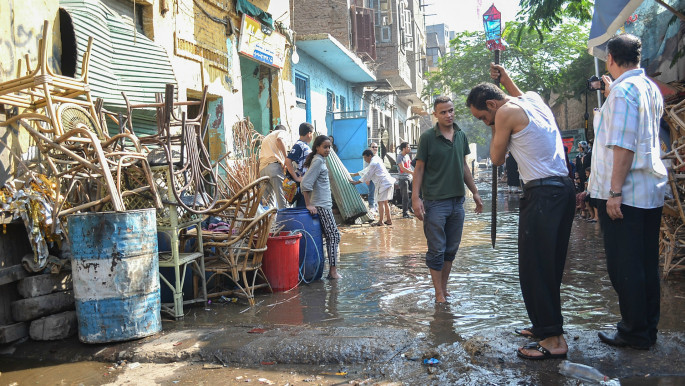
Hope offered for Syrian refugees denied to Egypt's poorest
International praise for Egyptian billionaire Sawiris's plan to house Syrian refugees has done nothing to reduce criticism of his role in forced eviction in some of Cairo's poorest areas.
4 min read
Sawiris gained international fame for offering an island for refugees [AFP]
Earlier this week, it was reported that the Egyptian billionaire Naguib Sawiris is going ahead with plans to resettle thousands of Syrian refugees on an island, named after the drowned Alan Kurdi whose picture made front pages across the world.
"I have got around 10,000 emails. Many people said they would volunteer to come and help me build this city, I have two people saying they want to donate $10m and so on," he said in an interview with Newsweek.
"In my office, I have [my staff] collecting all the requests so when we start we can call on these people."
On Monday the billionaire shared an updated plan from his communication office where he had identified two islands to resettle refugees from Syria.
| There is a contradiction between what he says about the refugees and what he is responsible for in Egypt in regards to violation of the right to housing |
Sawiris' plans have been criticised as infeasible and unethical by those who view the island as a short-term solution.
However, while he is planning to resettle Syrians on the island, many are fighting against plans to displace residents from central Cairo, due to development plans that involve Sawiris.
"There is a contradiction between what he says about the refugees and what he is responsible for in Egypt in regards to violation of the right to housing", said Rabie Wahba, a housing and land rights consultant in Ciaro.
"Whether directly in providing apartments that are not adequate in Haram City (a Cairo suburb), or indirectly in implementing the Maspero project and making the local authorities to issue a decree to evict the inhabitants of that area which made last July."
Sawiris owns the Nile City Towers that loom over the informal areas (or slums) in Maspero. Orascom, the massive construction company owned by the Sawiris family, has reportedly long wanted to expand the river-fronted complex into Boulaq, but the residents have refused to leave.
These tensions have led to violent confrontations. Residents told housing rights groups that thugs harassed and threatened residents, prevented them from making improvements to their properties, and have even set homes on fire.
 |
|
| Maspero in the aftermath of the Italian consulate bombing [Anadolu] |
However, it was criticised for lack of affordability, and Orascom purchased 4.8 Million square-meters of land in the desert behind the pyramids of Giza at a heavily subsidized rate, before reportedly managing to selling them to middle classes at a high profit.
"There are a lot of problems in the construction shown in big cracks in the main housing units," said Wahba.
Following a fatal rock slide in Duwaqia, an informal area in east Cairo, residents were forcibly evicted to the settlement outside 6 October city.
Like many displaced residents of Cairo's central districts, the residents of Duwaiqa found themselves in uninhabitable housing units in undeveloped desert areas, and, as a result, lost much of their social cohesion. This affected their access to the city's services, such as schools and work.
Around 5000 of the residents were displaced a second time by Orascom, with Sawiris quoted as saying: "We do not want a slum to develop inside our compound."
Additionally, Sawiris has recently been at the centre of corruption allegations in Montenegro, where Osrascom was accused of corruption and bribing politicians, public figures in order to acquire the long-term lease for a part of the Lustica peninsula.
After the revolution in 2011, there was a short-lived clampdown on cronyism that dominated the headlines, during which Sawiris' brother, Samih was sentenced to two years in prison under allegations of corruption.
"I am the money man. Wherever I smell money I go," said Naguib Sawaris, who has been accused of corruption and bribery from Iraq to Italy.
Considering his track-record, Wahba speculated that he is "looking for a lucrative something in every step he takes".
Even if Sawiris is serious, considering his history of controversial projects, and allegations of corruption which surround the billionaire, is he really the right man for the job?





 Follow the Middle East's top stories in English at The New Arab on Google News
Follow the Middle East's top stories in English at The New Arab on Google News


